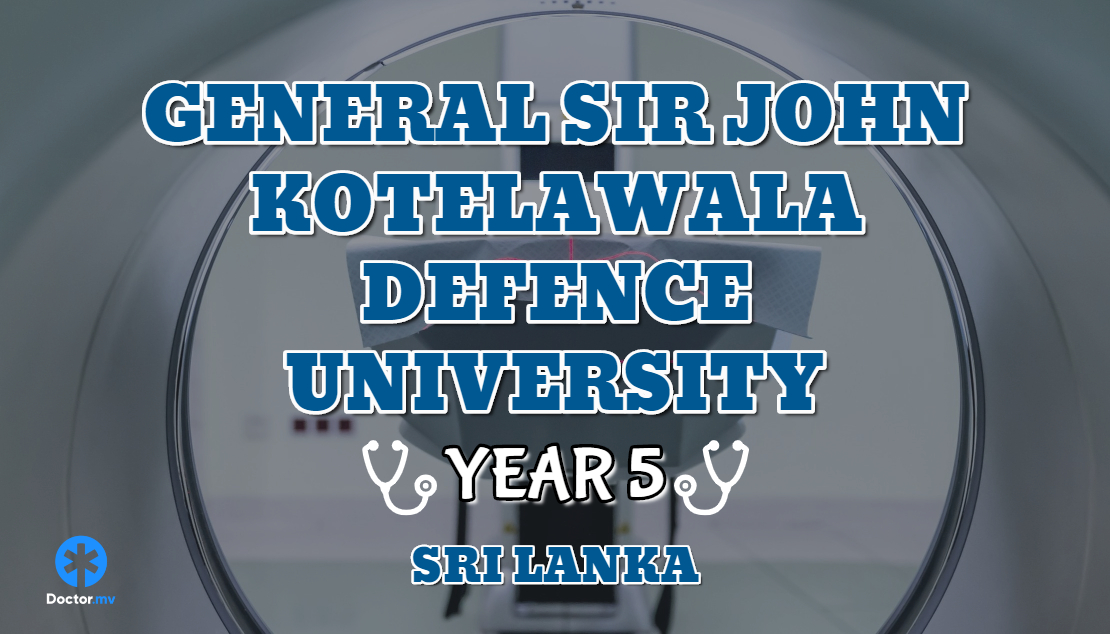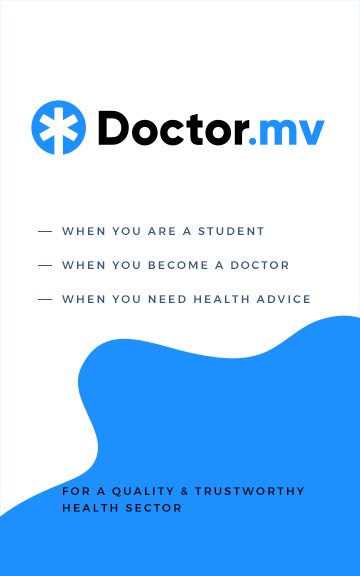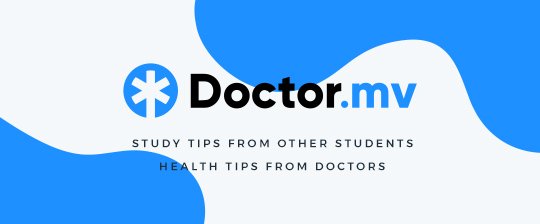I'm AFAAF AHMED NASHEED and this is My Medical Student Life

Nabeel Ibrahim
Published on: 29/09/2019
General Sir John Kotelawala Defence University Sri Lanka Fifth Year Afaaf Ahmed NasheedUniversity
General Sir John Kotelawala Defence University
Current Year
Fifth Year
Medical Specialty Interested in
Surgery
One Word that Describes You
Empathetic
Most Intriguing subject in Medical School
Pathology
What was your path to Medical School like?
I was a fairly average student performing well enough to keep my parents and teachers proud, if I dare say so myself. Aminiya School was my secondary school and Centre for Higher Secondary Education (CHSE) was my high school, and I felt fortunate that I got to study amongst the rest of students who showed such amazing potentials. I did my fair share of studying hard, going from one extra class to the other and then again from one tuition to the other. Words cannot describe how much I appreciate the level of knowledge and confidence I gained from these selected teachers. This is important to mention since I wouldn't have made it this far without them.
After graduating CHSE, I decided to join Indira Gandi Memorial Hospital (IGMH) to gain exposure in this particular field even though it was not my intention to become a doctor at the time. I wanted to be a psychologist. Regardless, I joined as a volunteer Clinical Assistant Trainee (CAT) and even though I was never made permanent, I loved working there. It made me realize how vast this field really was and honestly, I was in awe of everyone, be it doctors or nurses or even my fellow CATS. They were all incredible.
This however did not change my career decision. I quit IGMH when I got a permanent job in Villa International High School as a Lab Assistant and even though I loved the people and students I met and the friendships that I made, it was not my scene. This was when my parents decided to help me make my decision and we then applied for the Tertiary Student Loan Scheme and I was selected. We applied for several Universities, including ones in Bangladesh which gave me placements.
However my parents felt that it would be effective if I were to find a University close to home and hence we decided to go ahead with Sri Lanka. I was selected as a foreign student in Sri Jayawardanapura University along with a couple more Maldivian students.
Life was not pleasant for us there. We faced discrimination, harassment and racism within the first few months of joining and it was disheartening to say the least. It went to a point where they closed down the University for us first years to settle the issue. This was when the rest of my fellow Maldivians decided to quit that particular university and find placement elsewhere again.
It was also during this time that I got hospitalized and I underwent a surgery which rendered me bedridden for almost 2 months. During the time my father had contacted my current university (KDU) and helped me apply. KDU in turn had informed that I've gotten accepted and thus I started my journey as a medical student in General Sir John Kotelawala Defence University.
What was the biggest difference between your expectations of entering Med School when you were doing A'level, and the actual experience of being there?
I always had a very serene image of how a medical student's life would be. This was further enhanced since I have a cousin sister who is a doctor and she made it look all so easy. She always had a smile on her face and everything that was in relation to this just looked simple and straightforward. Or so she made it seem that way.
However, nothing could be further from the truth. The mere fact that you made it to a medical school does not guarantee that you will pass out as a doctor. Further, it's a definite guarantee that you won't pass out as the same person you were when you joined. This is a race, a fight, a struggle and it's sweat and blood and tears. Oh, so many tears. An experience definitely worth having if you're up for it.
How is your daily routine like?
Honestly, daily routine changes according to the clinical appointments. Since I am a final year medical student, we are currently doing our professorial appointments (Surgery, Medicine, Pediatrics, Gynecology and Obstetrics) I just completed my Pediatrics Professorial Appointment.
Our University has allocated several hospitals for us to go to in order to gain more clinical exposure. So, depending on the distance of the hospital from my house, the time I wake up differs as well. However it is always around 5-6 am. Sometimes as early 4:30 am in order to catch the bus. We are asked to be there at around 7-7:30am so that we can cover our patients and be prepared with history and examination findings by the time consultant does the ward round. Again, depending on the clinical rotation, the number of patients per student differs. Ward rounds are usually intense where the consultant could ask any possible question regarding your patient, or any condition for that matter. It's terrifying and anxiety inducing but definitely effective. After all, we are dealing with human lives, right?
After the ward rounds we usually have a class where we present our cases. Depending on that case being presented, the consultant or the doctor would then carry out an interactive session where we would all participate and discuss the management of the patient. This is something I genuinely like because it's interesting to see how different doctors approach different patients and it does make you wonder, 'Just what kind of a doctor would I make?'
After the ward classes we're all supposed to go to lecture that's arranged for the entire batch which is sometimes held in another hospital, 1 hour bus ride away. As unhealthy as it may be, I usually check whether this particular class would be effective for me or would it be better if I study alone or have a session with my friends. If I don't think that it would be effective I would skip these lectures. However if I do end up going, it would last until 4-5pm.
Following these, there are days where we have to go for casualty. Pediatric casualties are held in two particular hospitals. One hospital being 47 km away from University Hospital KDU and the other being 30km away. By the time we are done with casualties it's around 10-11pm and we are all beyond drained.
All in all, some days it takes around 4 hours just to travel from one place to another. Meals are sometimes taken during this time in the bus or at the hospital canteen, unless I decide to give myself a break and go home early. Either way every day is hectic, and you never go to bed feeling like you've not done enough. That's not true. There's always more to do.
Do you think Cadaveric Dissection is important for Medical students?
Definitely. I have heard of several universities where they carry out medical degrees without dissections and it's a concept which I can't wrap my head around. The core aspect of medicine is human body and how can one go further without mastering human body up close?
One needs to learn every nook and cranny, in this case; every nerve, artery and vein, every muscle, every organ, when it comes to something as complex as this.
How can you be confident enough to operate or scrub in with a real patient if you haven't acquired the skill of dealing with a real body with the help of a cadaveric dissection?
What excites you about medicine in general?
Patients.
The only thing that makes all of this worthwhile are the patients that I deal with on a daily basis. It's remarkable how much of an impact they can make in the life of a medical student. The bond you create with your patient during the period of their stay in the hospital is pure and just so very strong. Unbelievably so.
Regardless of what happened, my patients have never failed to uplift my mood and the conversation carried, despite the language barrier, is something I would always treasure. Our consultants have always advised us saying that the best way to learn is through our patients and I wholeheartedly agree. Create a bond with a patient and I can assure you that you will remember everything about the patient's condition, including the management, for the rest of your life. They themselves make it a point to teach us when we are at a loss. Patients respect you, love you and treasure you. This is always evident by the phone calls we get from our old patients calling in to check on us, the gifts we get and the blessings they bestow on us, their prayers for us. Losing them is like losing a member of your family. Just as heartbreaking. Every time.
Name your favorite medical text book.
Kumar and Clark's Clinical Medicine Book by Michael L. Clark and Parveen Kumar.
What would you say to a student planning to become a doctor, to gain fame and money only?
If it's only to gain fame and money then please don't pursue this career.
This is a field that requires passion and insane amount of hard work. Unless you're willing to put in the commitment, unless you're willing to make your entire life about your patients and their well being, just please stay away. One can always find fame and money elsewhere. A doctor's life is not glamorous. A patient's life is not to be exploited in such a way.
What is the most effective way to study in Medical School?
The right answer would be to study everyday, even if it's just a little bit. Read everything around your patient's condition in and out. The examination findings, the investigation findings, what are the sets of management that's required and the treatment protocols. To read through the guidelines and to make your own notes as you go. Of course, do the same if there's interesting cases in the ward and then again do the same for the cases being discussed in ward classes as well as lectures. Doesn't seem so practical though, does it?
First, breathe.
Come to terms with the fact that you won't know everything about everything and if you're a bit of a perfectionist this would even be a difficult thing to do. What you need to do is not burden yourself with a workload that you cannot handle . Make a timetable. Try to follow it. There are easier ways than trying to read entire chapters on Kumar and Clark or Bailey and Love. Understand and identify the important points that's absolutely necessary and learn that. Make your own notes as you go. Make notes while you're with your patient. Make notes while you're traveling on the bus. Make notes while you are in the lecture. Make it in a way that will help you remember. Draw diagrams and tables and charts. Download apps, there are so many out there that will definitely help you. Go to certain sites that helps you narrow down all the important points. Then teach it to your friends and colleagues. Teaching can be stressful for someone with anxiety but always try to teach others what you've learnt. Teach yourself what you've learnt by sitting in front of a mirror. This not only helps you build confidence but this also helps in your viva, long case and short case discussions.
However always remember to take breaks in between, take frequent naps. Self care is a must. Don't overwhelm your brain and allocate times to study and time for rest. You only get 24 hours in a day, after all.
Do you need High grades to become a decent doctor?
No. You need kindness, passion, hard work and empathy to become a decent doctor. I have seen really smart doctors, really smart medical students treating patients as cases, a mystery to solve and move on. That's not what medicine is. It's always about the bond. Be kind and rest will follow.
Finally, what is the one tip/advice you want to give to our readers?
I cannot stress this enough, but medical life is a difficult life. Medical school is frustratingly tough, an intern's life would be twice as tough and the pattern will continue on for the rest of your life. You need to always put your patient first beyond anything. Including you. Including your family. You will have relationship issues, you'll lose a lot of friendships, and that's just the tip of the iceberg.
You'll face hardships beyond what you've anticipated and sometimes it feels like all that you're ever dealing with is stress. To an extent, that is true. Stress becomes a part of your life. Failure becomes a part of your life. If you're someone who's like me, who has never experienced what it feels like to fail, it might come across as a huge blow. Something that can fundamentally change your entire perspective on yourself. Don't let it. You're still smart. You can still do it.
At times, the claws of depression might pull you back. Learn to laugh through it. Anxiety might hit you out of nowhere and you might find yourself struggling to breathe through a panic attack. Breathe anyway.
Find your crowd. Find the people that you feel comfortable with. Let them make you happy. Help them be happy. You're each other's lifelines. Help lift them up. Medical School is one where they have accumulated the most competitive people from everywhere. Don't let them drag you into the race. You find your own pace. You win your own race. Life is hard. Don't make it harder. Most of all, believe in yourself. You're here now, show them you can do it. Love yourself enough to do it. For you. Always do it for you.
The My Medical Student Life series was created for the sole purpose of helping medical students and aspiring doctors on their journey to become a successful Maldivian Healthcare Professional. Have a suggestion, idea or question? Email us.



Leave a comment
0 Comments